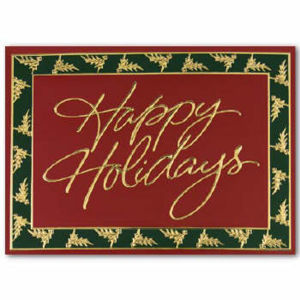
Christmastime greetings are a selection of greetings that are often spoken with good intentions to strangers, family, friends, or other people around the time of Christmas.
Some greetings are more prevalent than others, depending on the cultural and religious status of any given area.
Contents |
History
Though Christmas has been celebrated since the 4th century AD, the first known usage of any Christmastime greeting, "Merry Christmas and a Happy New Year" (thus incorporating two greetings) was in an informal letter written by an English admiral in 1699. The same phrase appeared in the first Christmas card, produced in 19th century England.
The then relatively new term "Merry Christmas" figured prominently in Charles Dickens' A Christmas Carol in 1843. The cynical Ebenezer Scrooge rudely deflects the friendly greeting and broods on the foolishness of those who utter it. "If I could work my will," says Scrooge, "every idiot who goes about with 'Merry Christmas' on his lips, should be boiled with his own pudding." After the Spirits of Christmas effect his transformation, he is able to heartily exchange the wish with all he meets. The continued popularity of A Christmas Carol and the Victorian era Christmas traditions it typifies have led some to credit Dickens with popularizing, or even originating, the phrase "Merry Christmas"[1].
The alternative "Happy Christmas" gained wide usage in the late 19th century, and is still common in the United Kingdom and Ireland. One reason may be the alternative meaning, still current there, of "merry" as "tipsy" or "drunk." Queen Elizabeth II is said to prefer "Happy Christmas" for this reason[2]. In American poet Clement Moore's "A Visit from St. Nicholas" (1823), the final line, originally written as "Happy Christmas to all, and to all a good night," has been changed in many editions to "Merry Christmas to all", perhaps indicating the relative popularity of the phrases in the United States.
Merry / Happy Christmas
The origin of this greeting can be viewed in the History section above. It refers directly to the Christmas holiday and was initially the first greeting used for any holiday in the November–January timeframe (in unison with Happy New Year). This greeting is popular among Christians and the non-religious alike, though is not as popular with non-Christian religions. The greeting is frequently delivered when it is known that the receiver is a Christian or celebrates Christmas, but was used to a much stronger degree in the past (note that Christian populations were higher in the past). The nonreligious often use the greeting, however would usually focus heavily on the secular aspects of Christmas, rather than the Nativity of Jesus.
Its meanings and variations are:
- As "Merry Christmas", the traditionally used greeting, comprising of merry (jolly, happy) and Christmas (Old English: Cristes mæsse, for Christ's Mass).
- As "Merry Xmas", usually used to avoid the length of "Merry Christmas", with the "X" (sometimes controversially) replacing "Christ". (see Xmas)
- As "Happy Christmas", an alternative that is used in the United Kingdom and Ireland.
- As "Feliz Navidad", which is the Spanish language equivalent of "Happy Christmas", but is frequently used in English context.
As of 2005, this greeting still remains popular among countries with large Christian populations, including, among others, the United States, Canada, the United Kingdom, Ireland, Australia, and Mexico. It also remains popular in non-Christian areas such as the People's Republic of China and Japan, where Christmas is still widely celebrated due to Western influences. Though it has somewhat decreased in popularity in the United States and Canada over the past decades, polls from 2005 indicate that it is more popular than "Happy Holidays" or other generic alternatives[3][4].
References
- ^ Dickens' Christmas Sequels (stm). LetsGo Online (1998). Retrieved on 2006-06-11.
- ^ Christmas Words and Phrases (html). The Phrase Finder (2004). Retrieved on 2006-06-11.
- ^
- ^ "Merry Christmas" beats "Happy Holidays" In 2005 Usage (html). BusinessKnowledgeSource.com (2005). Retrieved on 2006-06-12.
See also
Categories: Christmas traditions




 216.73.216.133
216.73.216.133 User Stats:
User Stats:
 Today: 0
Today: 0 Yesterday: 0
Yesterday: 0 This Month: 0
This Month: 0 This Year: 0
This Year: 0 Total Users: 117
Total Users: 117 New Members:
New Members:
 216.73.xxx.xxx
216.73.xxx.xxx
 Server Time:
Server Time: